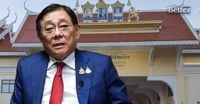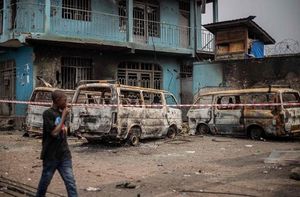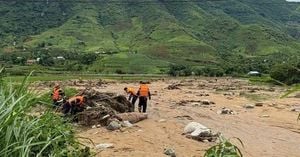As tensions flare along the Thai-Cambodian border, voices from various sectors are rising to call for peace and clarity amid a conflict that has already claimed lives and disrupted communities. The latest development sees Thailand and Cambodia agreeing to peace talks scheduled to take place in Malaysia on July 28, 2025, a critical step toward de-escalation in a region fraught with uncertainty.
Among those speaking out is Pee Hong, a South Korean rapper, YouTuber, and TikToker who has lived in Thailand for nearly two decades. With a substantial following of over 4.1 million on TikTok, Pee Hong used his platform to address the border conflict, offering a perspective grounded in his experience as a foreign resident in Thailand. In a video message delivered in Korean with Thai subtitles, he asserted that Cambodia initiated the violence, targeting civilian sites such as hospitals, petrol stations, and convenience stores. His words struck a somber tone: "Cambodia used violence and attacked Thailand first, targeting civilian areas such as hospitals, petrol stations, and convenience stores, resulting in deaths and injuries." He condemned these acts as "inhumane" and urged viewers to share accurate information to counter misinformation, emphasizing the importance of media literacy in turbulent times.
Pee Hong's appeal reflects a broader sentiment among Thai citizens and public figures who have expressed solidarity with those affected by the conflict. Prominent Thai entertainers, including Davika Hoorne, Nusba Punnakan, Bow Maylada, and Alek Teeradech, have publicly offered support, whether through social media messages promoting peace or efforts to raise funds for those displaced by the fighting. Their involvement underscores the human toll of the conflict beyond political headlines, highlighting the fears and hardships endured by ordinary people living near the border.
Meanwhile, Thailand’s Deputy Prime Minister and Minister of Finance, Pichai Chunhavajira, has issued a strong statement urging Cambodia to cease hostilities immediately. Posting on both Facebook and X, Pichai stressed the importance of restraint and the need to prioritize the well-being of civilians on both sides. He highlighted the severe violation of international law represented by attacks on non-military targets, including hospitals, schools, petrol stations, and convenience stores, calling such actions a "grave violation of international law, the Charter of the United Nations, and international humanitarian law."
He further warned that Cambodia’s continued aggression risks isolating the country on the international stage, damaging its credibility and economic prospects. "Such actions will only risk isolating Cambodia on the international stage and may ultimately undermine its own national interests — both in terms of global confidence and long-term economic opportunities," Pichai wrote. His message was clear: peace is not just a humanitarian imperative but a foundation for stability and prosperity. "Peace is the foundation of prosperity. Respect for human life is the cornerstone of enduring stability," he concluded.
This call for peace comes at a pivotal moment. The scheduled negotiations in Malaysia represent a significant opportunity for both nations to resolve their differences diplomatically. The hope is that dialogue will replace violence, allowing for sustainable economic cooperation and the protection of civilians caught in the crossfire.
However, the situation on the ground remains fraught. Reports of sporadic clashes and uncertainty persist, with civilians forced to flee their homes amid fear and destruction. The targeting of civilian infrastructure, as highlighted by both Pee Hong and Pichai Chunhavajira, exacerbates the humanitarian crisis, making the urgency of peace talks all the more pressing.
In the midst of this, the role of media and public figures becomes crucial. Pee Hong’s plea for accurate information and responsible media consumption aims to combat the spread of misinformation that can inflame tensions further. His unique position as a foreigner who calls Thailand home offers an outsider’s perspective that reinforces the universal desire for peace and safety.
Simultaneously, the involvement of Thai celebrities and influencers in advocating for peace and supporting affected communities reflects a collective national spirit. Their voices contribute to a broader social movement that recognizes the human cost of conflict and the need for reconciliation.
As the world watches, the Thai-Cambodian border dispute serves as a stark reminder of how fragile peace can be and how vital it is to protect human lives and dignity. The scheduled talks in Malaysia could mark a turning point, but much depends on the willingness of both sides to engage sincerely and prioritize the welfare of their people over territorial disputes.
In this complex landscape, the messages from Pee Hong and Pichai Chunhavajira resonate deeply. They call not only for an end to violence but for a commitment to truth, understanding, and respect. Their words echo the hopes of many who long for a peaceful resolution that honors the sovereignty of nations while safeguarding the lives of civilians.
As negotiations unfold, the international community and local populations alike will be watching closely, hoping that this moment ushers in a new chapter of peace and cooperation in Southeast Asia.





